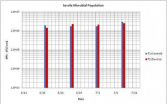(Press-News.org) San Antonio - Metastatic breast cancer patients whose blood contains circulating tumor cells (CTCs) before or after treatment with high-dose chemotherapy and blood stem cell transplant have shorter survival periods, according to a new study by researchers at The University of Texas MD Anderson Cancer Center in Houston.
The findings were presented today in a poster session at the 33rd Annual CTRC-AACR San Antonio Breast Cancer Symposium.
In addition, patients with higher percentages of epithelial cells, or the presence of a specific cellular transition, had higher chances for relapse.
"Building on the information from this study, we eventually may be able to use these molecular markers to identify breast cancer patients with a high likelihood of developing metastasis or relapsing. This may allow physicians to design specific treatments to help patients achieve better outcomes," said James M. Reuben, Ph.D., professor in MD Anderson's Department of Hematopathology, and co-corresponding author of the study.
Stem cells have common receptor
High-dose chemotherapy followed by autologous hematopoietic peripheral blood stem cell transplantation (ASCT) offers modest complete response rates for some patients with metastatic breast cancer. However, tumor cells that spread to the bone may be recruited and mobilized along with hematopoietic stem cells to increase a patient's chance of relapse.
"We hypothesized that since the breast tumor cells have the same CXRX4 receptor as hematopoietic stem cells, we might mobilize or recruit tumor cells by using a growth factor proven to mobilize blood stem cells," Reuben said.
Epithelial-to-mesenchymal transition (EMT) is recognized as an important part of metastasis. Epithelial cells line the organs and cavities of the body and usually are not mobile. Mesenchymal cells are mobile and can differentiate into many cell types, for example, to repair injury. EMT has been shown to repress E-cadherin, decrease cell-cell adhesion and increase a cell's capacity to move. An estimated 80 percent of solid tumors are cancers of the epithelial tissue.
Blood examined for epithelial cells, CTC
Aphaeresis was used to harvest blood stem cells from 21 metastatic breast cancer patients before transplantation. To determine levels of CTCs, blood samples were collected before aphaeresis (baseline) and one month after transplantation.
"We used the flow cytometry method of staining for both epithelial and stem cell markers," said Hui Gao, Ph.D., a research scientist in MD Anderson's Department of Hematopathology and co-first author of the study. "Then we enumerated the percentages of epithelial cells and cancer stem cells to see how these correlated with patient survival."
Cells, survival correlated
The median time to follow-up after transplant was 16.4 months. At follow-up, eight women were cancer free, and 13 had relapsed. The median time to relapse was nine months, and median survival was 14.4 months.
CTCs were found in six patients before and in nine patients after transplant. Patients with more than five CTCs before transplant had shorter overall survival. If five or more CTCs were found after transplant, both relapse-free and overall survival times were shorter.
Patients with percentages of CD326+ epithelial cells above the median had shorter relapse-free survival times,10 months versus 23 months. Also, patients with CTCs with mesenchymal features had a shorter relapse-free survival, seven months, compared to those who had CTCs without such features, 23 months.
Next steps
The researchers hope to carry the research forward into a prospective study in the near future.
"If we really can target CTCs with mesenchymal features, we may be able to control disease much more efficiently," said Naoto T. Ueno, M.D., Ph.D., professor in MD Anderson's Departments of Breast Medical Oncology and Stem Cell Transplantation and Cellular Therapy, and co-corresponding author of the study.
###
Co-authors with Gao, Reuben and Ueno include, from MD Anderson: Bang-Ning Lee, Ph.D.; Evan Cohen, B.S.; Michelle Davis, M.S.; and Antonio Giordano, M.D. Michael Mego, M.D., Ph.D., National Cancer Institute, Slovak Republic; and Massimo Cristofanilli, M.D., Fox Chase Cancer Center, also contributed to the research.
The research was funded by grants from The University of Texas Health Science Center, the National Cancer Institute, the State of Texas Rare and Aggressive Breast Cancer Research Program and an American Airlines Susan G. Komen Promise Grant.
About MD Anderson
The University of Texas MD Anderson Cancer Center in Houston ranks as one of the world's most respected centers focused on cancer patient care, research, education and prevention. MD Anderson is one of only 40 comprehensive cancer centers designated by the National Cancer Institute. For seven of the past nine years, including 2010,
MD Anderson has ranked No. 1 in cancer care in "America's Best Hospitals," a survey published annually in U.S. News & World Report.
END
A gene target for drug resistance, a triple-drug cocktail for triple negative breast cancer, and patients' risk for carpal tunnel syndrome are among study highlights scheduled to be presented by Johns Hopkins Kimmel Cancer Center scientists during the 33rd Annual CTRC-AACR San Antonio Breast Cancer Symposium, held Dec. 8-12. The information is embargoed for the time of presentation at the symposium.
HOXB7 GENE PROMOTES TAMOXIFEN RESISTANCE
(Presentation # PD05-10)
Many postmenopausal women with early-stage breast cancers who initially respond well to tamoxifen become ...
A gene target for drug resistance, a triple-drug cocktail for triple negative breast cancer, and patients' risk for carpal tunnel syndrome are among study highlights scheduled to be presented by Johns Hopkins Kimmel Cancer Center scientists during the 33rd Annual CTRC-AACR San Antonio Breast Cancer Symposium, held Dec. 8-12. The information is embargoed for the time of presentation at the symposium.
TRIO OF DRUGS MAY COMBAT "TRIPLE NEGATIVE" BREAST CANCER
(Presentation # PD01-05)
Working with cell cultures and mouse models, researchers at the Johns Hopkins Kimmel ...
A gene target for drug resistance, a triple-drug cocktail for triple negative breast cancer, and patients' risk for carpal tunnel syndrome are among study highlights scheduled to be presented by Johns Hopkins Kimmel Cancer Center scientists during the 33rd Annual CTRC-AACR San Antonio Breast Cancer Symposium, held Dec. 8-12. The information is embargoed for the time of presentation at the symposium.
SIMPLE FINGERTIP TEST MAY IDENTIFY BREAST CANCER PATIENTS AT RISK FOR CARPAL TUNNEL SYNDROME
(Presentation # P2-14-09)
As many as half of postmenopausal women taking aromatase ...
PITTSBURGH— Nonchemical treatment systems are touted as environmentally conscious stand-ins for such chemicals as chlorine when it comes to cleaning the water-based air-conditioning systems found in many large buildings. But a recent study by University of Pittsburgh researchers suggests that this diverse class of water-treatment devices may be ineffective and can allow dangerous bacteria to flourish in the cooling systems of hospitals, commercial offices, and other water-cooled buildings almost as much as they do in untreated water.
The two-year study by a team in Pitt's ...
"Directed Self-Assembly of Vertical Nanotubes for Biosensors, Logic, and Nano-Biofuel Cells," will be the focus of NJIT's exhibit today
at the National Nanotechnology Innovation Summit 10 http://www.nsti.org/events/NNI/, at the Gaylord Center in Washington, DC. The event celebrates the 10th anniversary of the national nanotechnology initiative.
NJIT was the only university in New Jersey selected for this exposition featuring practical applications of nanoscience resulting from the last decade of federal funding under the National Nanotechnology Initiative (NNI). ...
DALLAS – Dec. 10, 2010 – It's a medical Catch-22: carotid artery surgery can itself cause stroke, but so can asymptomatic carotid disease if left untreated.
UT Southwestern Medical Center researchers have now developed a clinical risk prediction rule using factors such as sex, race and health history to assess the danger the surgery poses, while a modified version will help patients make a more fully informed choice about whether to have the procedure.
"It may take a thief to catch a thief, but physicians don't want to cause stroke while trying to prevent stroke, so ...
GALVESTON, Texas — "You'll be back on your feet in no time" is a phrase familiar to anyone who's ever had to spend time in a hospital. Now, a new study has shown that hospitalized elderly patients who literally "get back on their feet" by taking even short walks around a hospital unit tend to leave the hospital sooner than their more sedentary peers.
Conducted at the University of Texas Medical Branch at Galveston and described in a paper appearing in the current issue of Archives of Internal Medicine, the study draws on data collected from 162 hospitalized patients over ...
It is estimated that 38 million people worldwide are currently infected with HIV and that 4.1 million more are added each year. For scientists to design treatment therapies that are effective over the long-term it is essential to learn more about how the virus mutates and develops resistance to medications.
New, groundbreaking research by University of Victoria biomedical engineer Stephanie Willerth has significantly advanced the understanding of HIV and how to treat it.
"The virus mutates at a very high rate which is very problematic for HIV patients because the virus ...
(Washington, DC) – A recent study of the use of metaphors in spoken language and various sign languages shows that certain types of metaphors are difficult to convey in sign language. The study, "Iconicity and metaphor: Constraints on metaphorical extension of iconic forms," to be published in the December 2010 issue of the scholarly journal Language, is authored by Irit Meir of the University of Haifa. A preprint version is available on line at:
http://lsadc.org/info/documents/2010/press-releases/meir.pdf.
Dr. Meir's research sheds new light on the interrelations between ...
The December issue of The Quarterly Review of Biology is now available. The issue features articles on the nature of individual organisms, evolution observed in the lab, play behavior across animal species, and a criticism of intelligent design creationism. Abstracts are available at http://www.journals.uchicago.edu/toc/qrb/current.
What is an Individual?
For organisms like fish, mice, and people, it's not hard to distinguish between individuals. However, for colonial creatures like corals and anemones, and for organisms like slime molds and bacteria, the line separating ...

